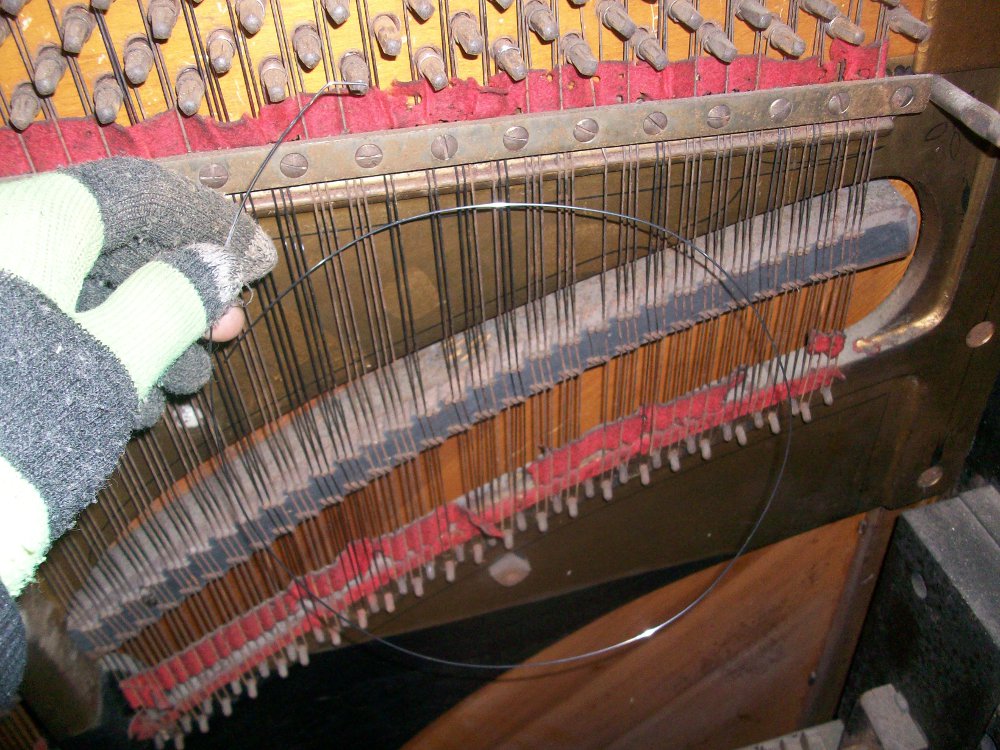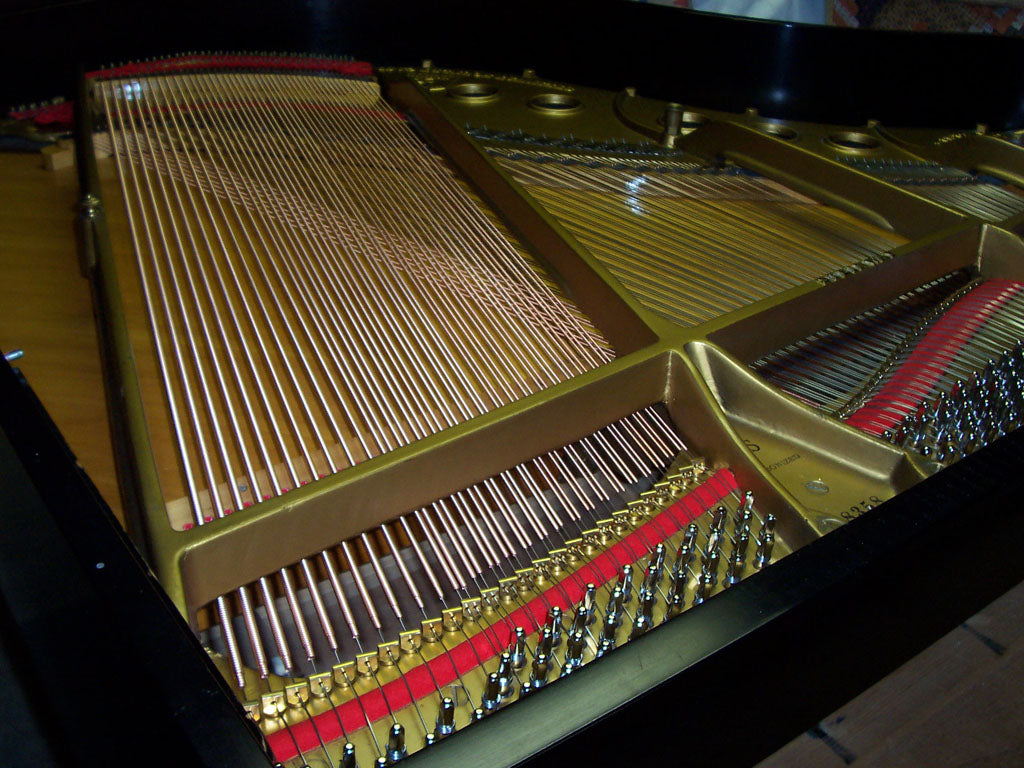Piano strings rarely break, typically lasting several years with normal usage. Regular maintenance and gentle playing can extend their lifespan significantly.
Pianos are revered for their ability to weave harmonious melodies and serve as the centerpiece of musical performances, composure, and practice for centuries. Ensuring their longevity requires understanding the factors affecting the durability of their strings. Climate, frequency of use, and the intensity of play all play a role in how long the finely tuned wires withstand the demands of music creation.
Pianists and technicians alike appreciate the intricacies of these instruments and strive to prevent the breaking of strings, which can disrupt performance and require skilled repair. With the right knowledge and care, a piano’s strings can provide countless hours of rich sound and joy to both players and listeners. Maintaining a piano in a stable environment with regular tunings is key to minimizing the occurrence of snapped strings, preserving the instrument’s majestic sound.
The Lifespan Of Piano Strings
Piano strings are the soul of the instrument’s rich sound. Many factors influence the life of these strings,
from their quality to the frequency of use. Under the right conditions, piano strings can last quite a long time.
Factors Determining String Longevity
A string’s life can stretch long or snap short. Here’s why:
- Material: High-quality steel lasts longer.
- Environment: Stable humidity and temperature are key.
- Maintenance: Regular tuning and cleaning extend life.
- Usage: Gentle fingers preserve strings.
Average Lifespan Before Replacement
A timeless song, the piano’s melody lives on – usually, bass strings hum for 20 to 30 years
while treble strings can chime in for longer. Let’s see the general lifespan:
| String Type | Lifespan |
|---|---|
| Bass Strings | 20-30 years |
| Treble Strings | 30-40 years |

Credit: pianotunerleeds.co.uk
Common Reasons For Piano String Breakage
Are you hearing a snap instead of a beautiful note when playing your piano? Piano string breakage can happen, but understanding why is key to prevention. Let’s explore the most common causes.
Excessive Tension And Tuning
Pushing the limits of your piano strings can lead to trouble. Excessive tension often occurs during tuning. Pianos need regular tuning, but too much force or improper technique can overstretch the strings. This causes them to break. Always use a professional tuner to avoid such issues. They know how to handle the delicate balance needed to keep your piano sounding perfect.
Environmental Influences
Your piano is sensitive to its surroundings. Humidity and temperature changes impact the strings in a big way. High humidity can lead to rust, weakening the strings until they snap. On the other hand, dry conditions can make strings brittle. Aim to keep your piano in a controlled environment. A consistent temperature and humidity level are vital for its health. Table below displays ideal conditions:
| Factor | Ideal Condition |
|---|---|
| Humidity | 42-60% |
| Temperature | 20-22°C (68-72°F) |
Wear And Tear Over Time
Just like people, pianos show their age. Years of use lead to natural wear and tear. The strings experience constant pressure and movement which eventually leads to failure. Older pianos may need string replacements to restore their sound. Check your piano’s age and consider consulting a technician to assess its condition. Proper care can extend the life of your piano strings significantly.
Signs Of Impending String Failure
Recognizing the signs of an oncoming string failure in your piano plays a pivotal role in maintaining its beautiful sound and integrity. Pianos, symbolizing both elegance and durability, don’t often succumb to string breaks. But staying vigilant can help you avoid the sudden silence of a snapped string. Let’s explore the tell-tale signs to watch for.
Unusual Tuning Difficulties
Challenges in tuning can herald the decline of piano strings. When a once harmonious piano begins to disagree with the tuner’s touch, it may indicate stress and wear in its strings. Here’s what to notice:
- Pitch doesn’t hold: Quickly retuning suggests string issues.
- Inconsistent sound: Listen for strings that resonate oddly or buzz.
- String reaction: If tuning doesn’t smooth out the sound, investigate further.
Visual Inspection Cues
Observing your piano strings can provide critical clues before a break happens. Regular inspections ensure prompt identification of potential problems. Look for these indicators:
- Rust or corrosion: Metal fatigue leads to breaks.
- Coil condition: Imperfect coils can weaken strings.
- Fraying: Frayed strings are closer to snapping.
Preventative Measures And Maintenance
The strings of a piano are sturdy, designed to withstand thousands of strikes. Yet, breakages can still occur. Proper upkeep and gentle handling help. Preventative measures and regular maintenance reduce the risk of snapping strings and maintain the piano’s harmonic embrace.
Regular Tuning And Servicing
Consistent tunings and regular check-ups are crucial for piano longevity. Professionals recommend tuning twice a year. They can identify potential issues early, saving you from unexpected string snaps.
- Professional technicians: They ensure optimal tension and structural integrity. Your piano stays in top form under their care.
- Seasonal adjustments: Pianos react to seasonal changes. Experts will adjust for these variations during servicing.
Controlled Humidity And Temperature
Maintain a stable environment for your piano. Extreme temperatures and humidity are not its friends. These conditions can warp a piano’s structure and lead to string deterioration.
| Action | Benefit |
|---|---|
| Use a dehumidifier in damp conditions | Prevents rust on strings |
| Position piano away from heat sources | Maintains tuning stability |
Gentle Playing Techniques
Heavy-handed playing puts undue stress on piano strings. Teach correct finger techniques to beginners. Experienced players should also remain mindful. Gentle playing extends string life exponentially.
- Practice soft touch exercises.
- Avoid banging on the keys.
- Use correct hand positioning.
What To Do When A String Breaks
Piano strings are strong, yet they can snap. The sound of a breaking string is startling. Your beautiful melody suddenly ends with a harsh twang. Don’t worry! Understanding the right steps can make the situation less stressful.
Immediate Steps To Take
Once a string breaks, pause playing. Safety first! Check for any loose ends that may whip around. If you find any, gently push them away from the piano’s interior. This prevents damage to the piano’s inner mechanics.
- Stop playing the piano immediately to avoid further damage.
- Inspect the break carefully for potential hazards.
- Secure any loose string ends to protect the piano’s interior.
Professional Repair Vs. Diy
A professional technician fixes a string expertly. They adjust tension and ensure the piano stays in tune. A DIY fix is risky. You might damage the piano more without the right tools. When in doubt, choose a pro!
| Professional Repair | DIY |
|---|---|
| Expert tuning and adjustment | Risks further damage |
| Guaranteed results | Potential for incorrect installation |
Ensuring Proper String Replacement
Right size and type matter for a string. A mismatched string can hurt the piano’s sound. Ensure the string matches the original. Understand the pitch and size needed. Tag the broken string before removal. Match it with the new one.
- Match the new string with the broken one for size and pitch.
- Tag the broken string before removal to avoid confusion.
- Install the new string carefully, following proper guidelines.

Credit: shacklefordpianos.com
Impact Of Broken Strings On Piano Sound And Playability
The piano, an instrument of elegance and sophistication, can lose its charm if strings break. Broken strings impact not just the sound, but also how you play the piano. Let’s look at these effects in detail.
Influence On Overall Tone
A piano string’s snap can disrupt harmony. Imagine a choir missing a voice; the same occurs with pianos. Every string has a unique note. Without it, musical pieces lack completeness. Broken strings mean certain notes do not resonate. Hence, the overall richness and depth of the piano’s tone suffer.
- High-pitched notes can sound dull or muted
- Bass notes lose their powerful rumble
- Missing overtones create a less vibrant sound
Over time, pianos may require tuning more often, as unbalanced tension affects other strings. This is critical for concert pianists and recording studios where sound perfection is paramount.
The Piano’s Touch And Responsiveness
The experience of playing a piano is tactile. A broken string changes the feel under your fingers. Pianists rely on consistent response to play with emotion and precision.
| Broken String Impact on Playability | Result |
|---|---|
| Altered key resistance | Uneven touch and control |
| Changes in string tension | Inconsistent key bounce-back |
| Reduced vibration feedback | Difficulty in dynamic playing |
Novice players might struggle to maintain rhythm and flow. Professional pianists may find it impossible to perform at their best.
In summary, broken strings can seriously affect a piano’s sound and playability. They alter the tonal quality and the physical connection a musician feels with their instrument. This is why regular maintenance and prompt string repairs are crucial.
Can Frequent Piano Shutdowns Lead to More Breaks in Piano Strings?
Frequent piano shutdowns can indeed stress the instrument, potentially leading to more breaks in piano strings. The abrupt loss of tension can affect string integrity over time. To prevent this, troubleshooting your piano power issues is vital, ensuring a consistent performance and preserving the quality of your instrument.
Frequently Asked Questions Of How Often Do Piano Strings Break
Do Piano Strings Break Easily?
Piano strings are quite resilient and designed to withstand high tension; they do not break easily. Regular maintenance and proper use help to prevent breakage, ensuring a long lifespan for the strings.
How Long Do Piano Strings Last?
Piano strings can last for decades, but experts recommend inspecting them annually for optimal performance. Regular use and environmental conditions can affect their lifespan.
What Causes A Piano String To Snap?
Piano strings can snap due to over-tuning, wear and tear, corrosion, or exposure to extreme temperatures and humidity. Regular maintenance reduces this risk.
What Happens If A Piano String Snaps?
If a piano string snaps, the piano’s sound may become uneven or muted. The instrument needs restringing and potentially recalibrating by a professional technician to restore full functionality and sound quality.
Conclusion
Piano strings are remarkably durable, but not immune to wear and tear. Regular maintenance and proper care extend their life significantly. Remember, frequent tuning and a stable environment keep string breakages at bay. So, cherish your instrument’s melodious health by staying attentive to these needs.
Keep playing, keep caring!
